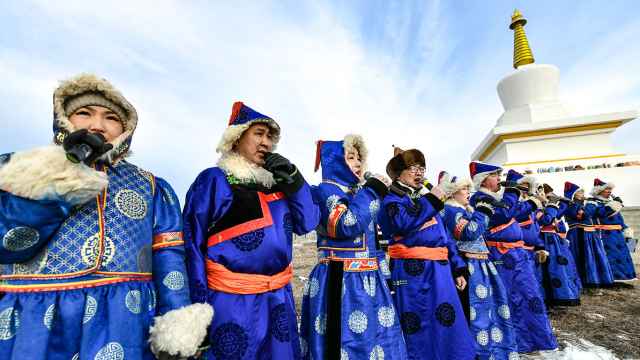I have often noted in this space that I am lousy about writing to a specific date. When noting anniversaries and historical events, I am often too early or too late. Blame it on my editors. They keep me so busy I can't keep track of time.
This week, as I cast a glance in the direction of the legendary Russian director Yevgeny Vakhtangov, I'm both late and early. With Vakhtangov at the helm, the Third Studio of the Moscow Art Theater, now known as the Vakhtangov Theater, opened its doors on Nov. 19, 1921. As fate would have it, Vakhtangov would die seven months later at the age of 39. As such, I have missed the 90th anniversary of the theater and am jumping the gun with regard to the 90th anniversary of the director's death. But 2011 also marks the 100th anniversary of Vakhtangov joining the company of the Moscow Art Theater, so let's consider all this good reason for a small blog tenuously attached to a timeline.
I only vaguely remember how a large envelope of old photographs of Vakhtangov and his theater came into my possession several years, even decades, ago. I know they originally belonged to the Iskusstvo publishing house, but that is not where I acquired them. What I do know is that I was told by someone that this envelope was slated to be thrown out. All of these photos — not originals, mind you, but intriguing photos nonetheless — were earmarked for the ashcan. That seemed much too ignominious an end to someone like myself, wracked with pack-rat inclinations.
So I saved the photos and never did anything with them. Until now. All the Vakhtangov jubilees came to the rescue.
In the first image above, I combined two photos — a portrait of Vakhtangov in 1918 and a portrait of Konstantin Stanislavsky, which the great director signed and presented to Vakhtangov on April 20, 1915.
Vakhtangov, who was of Armenian and Russian descent, was born in 1883 in the North Caucasus city of Vladikavkaz. The main theater in that city is now named in his honor. While studying law and natural sciences at Moscow State University, Vakhtangov increasingly became interested in theater. He studied with a group of Moscow Art Theater actors and later joined the theater to study under Stanislavsky and Vladimir Nemirovich-Danchenko.
Along with Vsevolod Meyerhold, who passed through the Art Theater a decade earlier, Vakhtangov was one of Stanislavsky's most illustrious and favorite pupils, as can be ascertained by the autograph on the portrait reproduced above. The text reads, in part:
"To [my] dear and sincerely beloved Yevgeny Bagrationovich Vakhtangov, … You are the first fruit of OUR renewed art. I love you for [your] talent as a teacher, director and actor; for your pursuit of the REAL in art; for your ability to discipline yourself and others … ."
Indeed, to this day, the few productions staged by Vakhtangov before he died remain legendary. They include Anton Chekhov's "Wedding," Maurice Maeterlinck's "The Miracle of St. Antony," August Strindberg's "Erik XIV" and Carlo Gozzi's "Princess Turandot." His production of "The Dibbuk" at the Habima Jewish Studio in 1922 is no less historic. Vakhtangov's achieved a light, colorful style through precise acting and directing, and his style is still considered the standard at the Shchukin Institute, which prepares actors to work at the theater that bears his name in Moscow (or in other professional theaters).
Vakhtangov was also a favorite of Nemirovich-Danchenko, who shared duties as artistic director with Stanislavsky at the Moscow Art Theater. On April 7, 1922, Nemirovich-Danchenko apparently returned home after attending Vakhtangov's production of "Princess Turandot" and felt the need to respond to the experience in some way.
"To Yevgeny Bagrationovich Vakhtangov," he wrote in the margins around one of his portraits, which is reproduced above as the second photo in a small gallery. "The night following 'Princess Turandot.' I am grateful for [the] sublime artistic joy [you provided], for [your] marvelous achievements; for [your] noble courage in solving the newest theatrical challenges. For embellishing the name of the Art Theater."
Just over seven weeks later, Vakhtangov was dead.
A Message from The Moscow Times:
Dear readers,
We are facing unprecedented challenges. Russia's Prosecutor General's Office has designated The Moscow Times as an "undesirable" organization, criminalizing our work and putting our staff at risk of prosecution. This follows our earlier unjust labeling as a "foreign agent."
These actions are direct attempts to silence independent journalism in Russia. The authorities claim our work "discredits the decisions of the Russian leadership." We see things differently: we strive to provide accurate, unbiased reporting on Russia.
We, the journalists of The Moscow Times, refuse to be silenced. But to continue our work, we need your help.
Your support, no matter how small, makes a world of difference. If you can, please support us monthly starting from just $2. It's quick to set up, and every contribution makes a significant impact.
By supporting The Moscow Times, you're defending open, independent journalism in the face of repression. Thank you for standing with us.
Remind me later.






